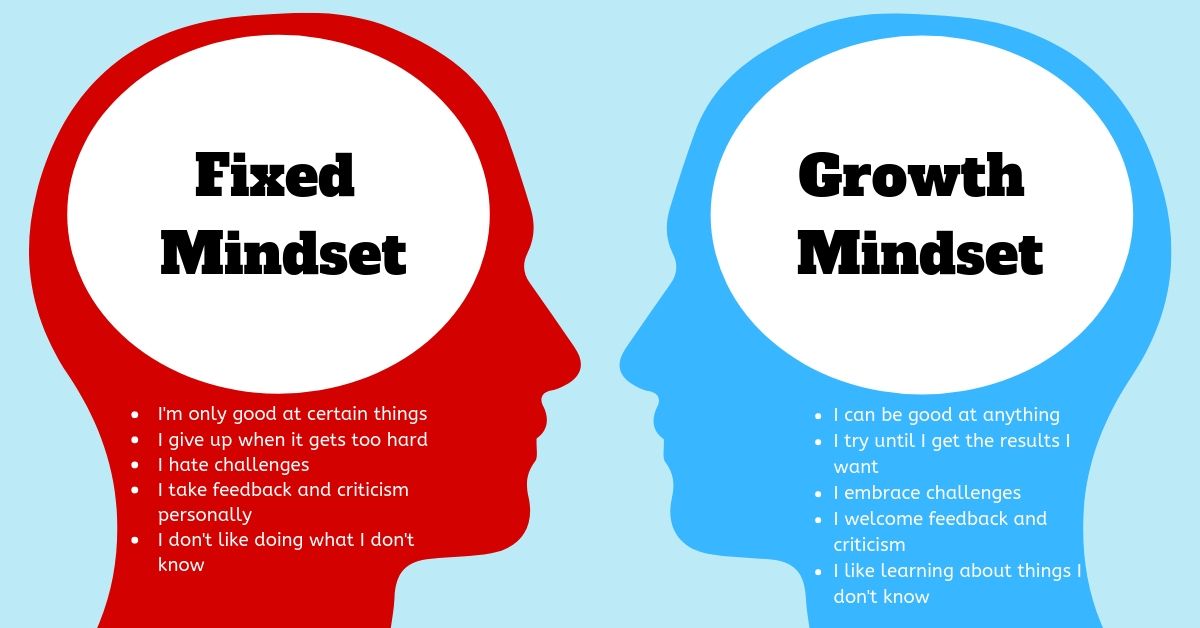
WHAT IS MINDSET?
Mindset refers to the collection of thoughts and beliefs that shapes one’s thought habits and your thought habits affect how you think, what you feel and what you do. Your mindset impacts how you make sense of the world and how you make sense of yourself. In a word, mindset can be referred to as a mental inclination/disposition or a frame of mind.
FIXED MINDSET VS GROWTH MINDSET
The theory of a fixed and growth mindset comes from Dr. Carol Dweck, a professor of psychology at Stanford University. Through her decades of research in motivation, intelligence and childhood development, she discovered that how a person sees their ability to learn usually falls into one of two categories. Further research revealed that these categories result in different long-term outcomes and that a person can change their mindset for the better if guided well.
FIXED MINDSET
A fixed mindset is defined as the belief that talents, intelligence and abilities are determined at birth and cannot be changed. People who believe that these components are fixed traits focus on appearing smart instead of learning and they are often discouraged when they don’t immediately grasp a concept. Fixed mindsets connect with the idea of learned helplessness in psychology, which is seen when people stop trying after they have repeatedly met negative outcomes.
GROWTH MINDSET
Growth mindset is the belief that talents, intelligence and abilities are easy to come by and can be developed or strengthened with practice. People with growth mindset characteristics often view difficult concepts as an exciting challenge and they are more likely to see mistakes as learning experiences. Dr. Dweck’s theory of growth mindsets in education aligns with brain plasticity, which is the concept that our thoughts and actions can improve our brain functioning.
WAYS TO DEVELOP A GROWTH MINDSET
- ACKNOWLEDGE AND EMBRACE IMPERFECTIONS: If you must grow, you must cultivate the habit of accepting your weaknesses. Hiding from your weaknesses means you’ll never overcome them.
- VIEW CHALLENGES AS OPPORTUNITIES: Having a growth mindset involves you seeing every challenge as an opportunity, never see challenges as a test that is aimed at mocking or sabotaging you rather challenges should be seen as a step towards growth.
- TRY DIFFERENT LEARNING TACTICS: There is no perfect style of learning, ensure you try different learning styles. What works for Mr. A might not work for you.
- FOLLOW THE RESEARCH ON BRAIN PLASTICITY: The research on brain plasticity shows that the human brain is not fixed, so there is no reason why you should assume otherwise. Train your mind to learn new things and accommodate necessary information.
- SEE “FAILING” AS “LEARNING”: Whenever you make a mistake or fall short of a goal, you haven’t failed; you’ve learned.
- STOP SEEKING APPROVAL: When you prioritize approval over learning, you sacrifice your own potential for growth. Just do what you think is right even though you might end up being wrong, doing things on your own has a way of developing you.
- VALUE THE PROCESS OVER THE END RESULT: Intelligent people enjoy the learning process and don’t mind when it continues beyond an expected time frame. Paying quality attention during your learning process helps in giving a better knowledge of what you are learning.
- CELEBRATE GROWTH WITH OTHERS: Celebrating growth with others has a unique way of boosting productivity. If you truly appreciate growth, you’ll want to share your progress with others.
- EMPHASIZE GROWTH OVER SPEED: Finishing a work fast doesn’t mean you have done it correctly, growth is a gradual process. Learning fast isn’t the same as learning well and learning well sometimes requires allowing time for mistakes.
- REDEFINE THE IDEA OF A “GENIUS”: It is a misconception that being a genius requires less work, redefine that belief. Being a genius requires hard work and not talent alone.
- SEE EVERY CRITICISM AS A POSITIVE REMARK: For you to grow, you have to see every criticism as a positive one that is geared towards developing you into a better student, so ensure to appreciate and value every criticism made during your learning process.
- DISASSOCIATE IMPROVEMENT FROM FAILURE: Stop assuming that “room for improvement” translates into failure.
- LEARN FROM OTHER PEOPLE’S MISTAKES: It’s not always wise to compare yourself to others but it is important to realize that humans share the same weaknesses. Ensure you learn from other people’s mistakes so that you don’t fall into the same ditch.
- MAKE A NEW GOAL FOR EVERY GOAL ACCOMPLISHED: You’ll never be done learning. Just because your midterm exam is over doesn’t mean you should stop being interested in a subject. Growth-minded people know how to constantly create new goals to keep themselves stimulated.
- TAKE OWNERSHIP OVER YOUR ATTITUDE: Once you develop a growth mindset, own it. Acknowledge yourself as someone who possesses a growth mentality and be proud to let it guide you throughout your educational career.
The original post can be found here.


